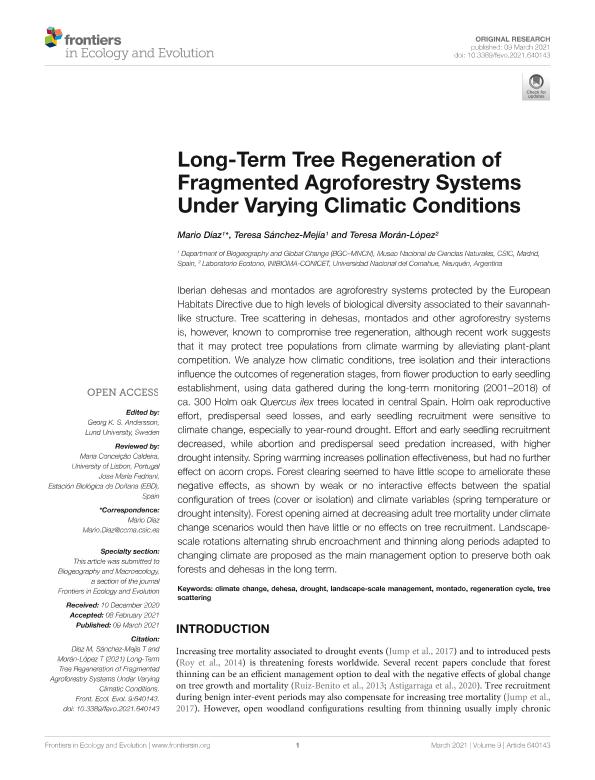Mostrar el registro sencillo del ítem
dc.contributor.author
Díaz, Mario
dc.contributor.author
Sánchez Mejía, Teresa
dc.contributor.author
Morán López, Teresa

dc.date.available
2023-01-05T18:00:00Z
dc.date.issued
2021-03
dc.identifier.citation
Díaz, Mario; Sánchez Mejía, Teresa; Morán López, Teresa; Long-Term Tree Regeneration of Fragmented Agroforestry Systems Under Varying Climatic Conditions; Frontiers Media; Frontiers in Ecology and Evolution; 9; 3-2021; 1-11
dc.identifier.issn
2296-701X
dc.identifier.uri
http://hdl.handle.net/11336/183585
dc.description.abstract
Iberian dehesas and montados are agroforestry systems protected by the European Habitats Directive due to high levels of biological diversity associated to their savannah-like structure. Tree scattering in dehesas, montados and other agroforestry systems is, however, known to compromise tree regeneration, although recent work suggests that it may protect tree populations from climate warming by alleviating plant-plant competition. We analyze how climatic conditions, tree isolation and their interactions influence the outcomes of regeneration stages, from flower production to early seedling establishment, using data gathered during the long-term monitoring (2001–2018) of ca. 300 Holm oak Quercus ilex trees located in central Spain. Holm oak reproductive effort, predispersal seed losses, and early seedling recruitment were sensitive to climate change, especially to year-round drought. Effort and early seedling recruitment decreased, while abortion and predispersal seed predation increased, with higher drought intensity. Spring warming increases pollination effectiveness, but had no further effect on acorn crops. Forest clearing seemed to have little scope to ameliorate these negative effects, as shown by weak or no interactive effects between the spatial configuration of trees (cover or isolation) and climate variables (spring temperature or drought intensity). Forest opening aimed at decreasing adult tree mortality under climate change scenarios would then have little or no effects on tree recruitment. Landscape-scale rotations alternating shrub encroachment and thinning along periods adapted to changing climate are proposed as the main management option to preserve both oak forests and dehesas in the long term.
dc.format
application/pdf
dc.language.iso
eng
dc.publisher
Frontiers Media

dc.rights
info:eu-repo/semantics/openAccess
dc.rights.uri
https://creativecommons.org/licenses/by-nc-sa/2.5/ar/
dc.subject
CLIMATE CHANGE
dc.subject
DEHESA
dc.subject
DROUGHT
dc.subject
LANDSCAPE-SCALE MANAGEMENT
dc.subject
MONTADO
dc.subject
REGENERATION CYCLE
dc.subject
TREE SCATTERING
dc.subject.classification
Ecología

dc.subject.classification
Ciencias Biológicas

dc.subject.classification
CIENCIAS NATURALES Y EXACTAS

dc.title
Long-Term Tree Regeneration of Fragmented Agroforestry Systems Under Varying Climatic Conditions
dc.type
info:eu-repo/semantics/article
dc.type
info:ar-repo/semantics/artículo
dc.type
info:eu-repo/semantics/publishedVersion
dc.date.updated
2022-10-06T13:15:39Z
dc.journal.volume
9
dc.journal.pagination
1-11
dc.journal.pais
Suiza

dc.description.fil
Fil: Díaz, Mario. Consejo Superior de Investigaciones Científicas. Museo Nacional de Ciencias Naturales; España
dc.description.fil
Fil: Sánchez Mejía, Teresa. Consejo Superior de Investigaciones Científicas. Museo Nacional de Ciencias Naturales; España
dc.description.fil
Fil: Morán López, Teresa. Consejo Nacional de Investigaciones Científicas y Técnicas. Centro Científico Tecnológico Conicet - Patagonia Norte. Instituto de Investigaciones en Biodiversidad y Medioambiente. Universidad Nacional del Comahue. Centro Regional Universidad Bariloche. Instituto de Investigaciones en Biodiversidad y Medioambiente; Argentina
dc.journal.title
Frontiers in Ecology and Evolution
dc.relation.alternativeid
info:eu-repo/semantics/altIdentifier/url/https://www.frontiersin.org/articles/10.3389/fevo.2021.640143/full
dc.relation.alternativeid
info:eu-repo/semantics/altIdentifier/doi/http://dx.doi.org/10.3389/fevo.2021.640143
Archivos asociados
